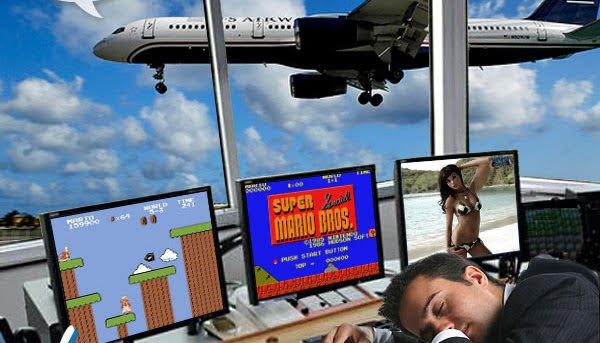Privatization Threat is Real for Law Enforcement, Too

CEO: “Who cares about safety? Look at all the money we’re making!”
Ed. note: This recent New York Times editorial is critical of the efforts to privatize air traffic control operations at our nation’s airports. These efforts by big corporations and other special interests to destroy the public sector and take over public safety, education, water, sewer, parking, libraries, and anything else you can think of, need to be stopped. We thought this op-ed piece had some good thoughts you can use as the battle heats up to turn the profession of law enforcement into a corporation where the employees have no right of collective bargaining—or anything else, for that matter. – Cynthia
Don’t Privatize Air Traffic Control
Some Republicans in the House have come up with a solution in search of a problem: privatizing air traffic control. Democrats, the Obama administration and sensible Republicans ought to oppose this measure, which would do nothing to improve the present, federally operated system and indeed could make it worse.
The proposal by Bill Shuster of Pennsylvania and Frank LoBiondo of New Jersey was voted out of the House Transportation and Infrastructure Committee along partisan lines on Thursday. Their bill would move the Federal Aviation Administration’s air traffic control division to a new private, nonprofit corporation financed by fees from airlines and private aircraft owners. They argue that this private organization could move more quickly and cheaply than the F.A.A. to reduce congestion and delays.
But there is no credible evidence that a privately operated system would be better than the current one, which is the busiest and safest in the world. And there is plenty of reason to believe it would be worse.
Only two other major countries have privatized air traffic control, Canada and Britain, but their air systems are much smaller. Other countries like Germany and France run air traffic through government-owned companies. Delta, which is the only large airline to oppose the Republican plan, notes that air traffic control costs have increased more in Canada and Britain than in the United States since they privatized. Britain had to bail out its private air traffic control operator after the 2001 terrorist attacks when air travel declined around the world. Even if a private system did reduce costs, there is no guarantee that airlines would pass those savings to passengers.














